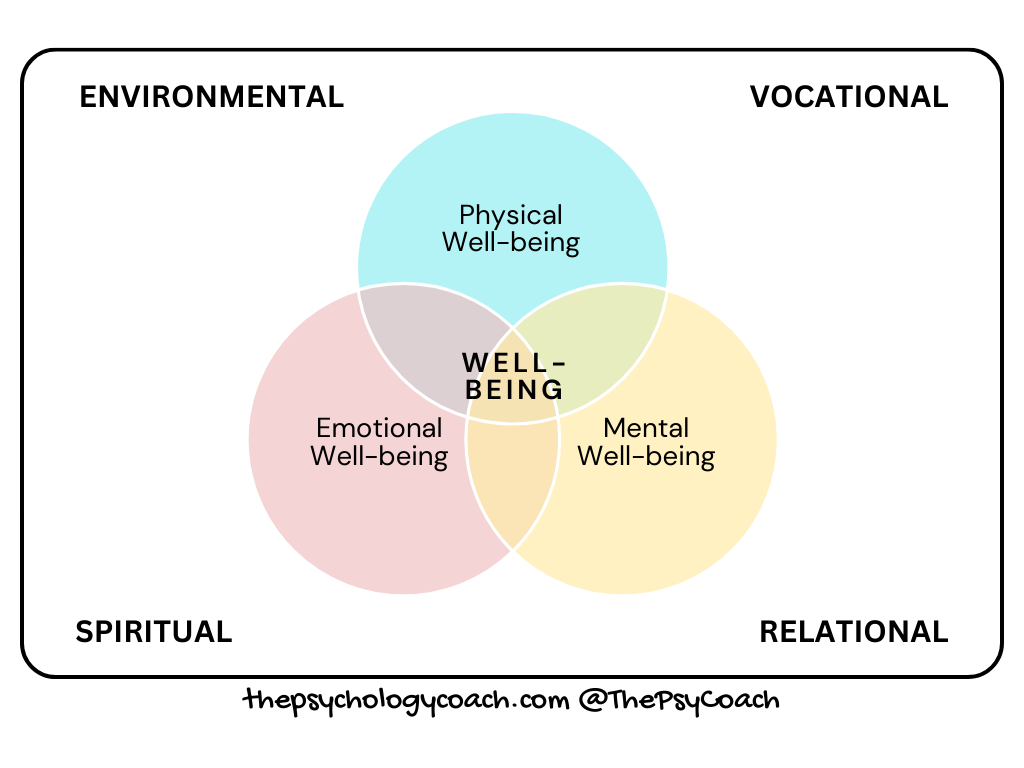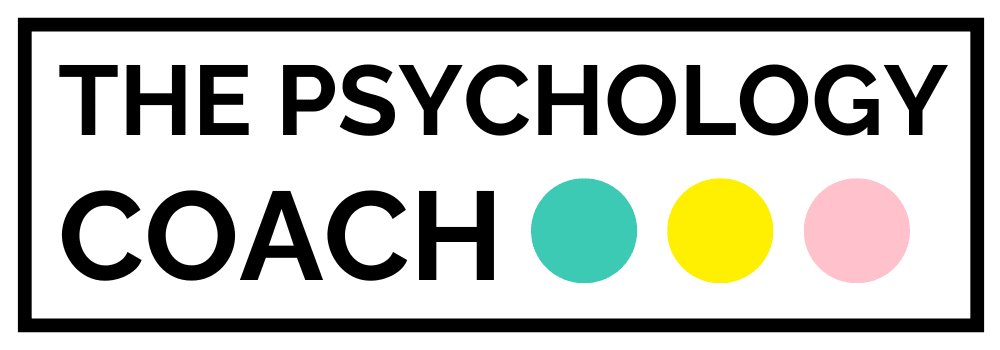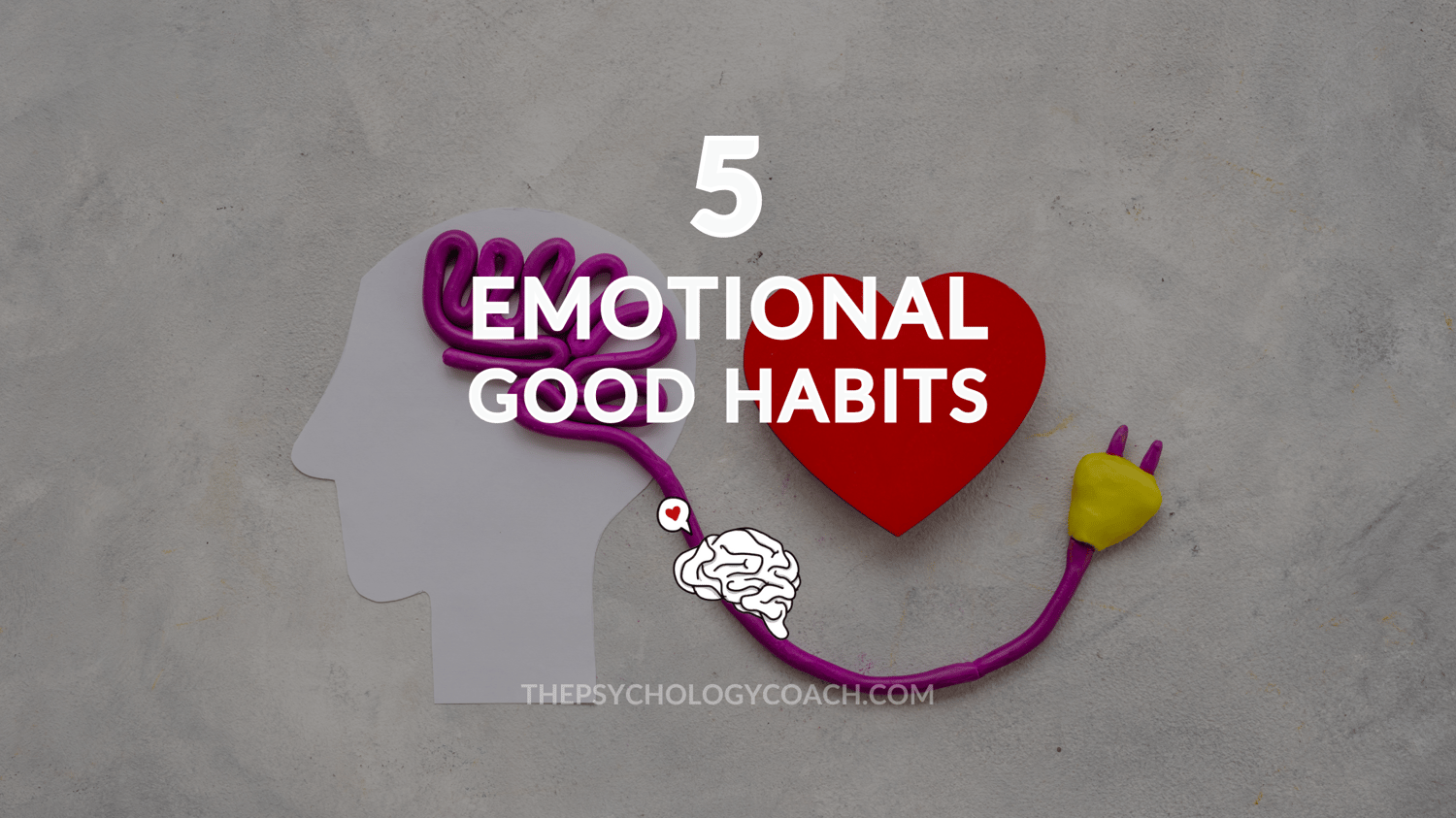Well-being is more than a fancy pair of yoga pants and a matcha latte. Nothing against them. I own a rainbow pair by the way but well-being is beyond any trend. It is a multidimensional concept and, for that reason, it is complex to define and limit.
Many aspects can and do influence well-being. In the well-being framework I work with, I focus on seven of them. However, seven is still a big number to begin thinking about our well-being journey, so I split my framework into two different parts.

One contains the basic dimensions of well-being (physical, mental and emotional well-being) and the other involves more specific aspects of our human life (social, vocational, environmental and spiritual well-being). If we start with the basics and build a good foundation around them, we can later venture out into other destinations.
In this article, I will focus on emotional well-being and share 5 good habits that can help us navigate through our emotional reality.
What is Emotional Well-being?

Emotional well-being includes our emotional health as well as the extent to which we can cope with and manage different emotions - both positive and negative.
How to Boost Your Emotional Well-being?
Emotional well-being entails aspects such as having a positive outlook on life, feeling life has meaning and purpose, having healthy emotional bonds with other people and being able to put healthy coping mechanisms into action. Here are 5 good habits that can help us achieve all these.
1. Practice Mindfulness

Mindfulness is the capacity to be anchored and actively engaged in the moment. Mindfulness helps us notice and feel our internal world, which in turn brings us closer to our emotional needs and potential solutions to satisfy such needs.
There are many ways to practice mindfulness. From traditional forms such as mindfulness meditation to doing the dishes in a fully conscious manner. There are multiple options to bring mindfulness into our lives.
One of my favourite ways of practising mindfulness is through writing or journaling. When we add mindfulness to our writing practice, we invite ourselves into a space in which we are fully aware and attentive. We are connected with the process of writing but also with our thoughts and emotions.
2. Build Healthy Relationships

Some relationships can make us feel good because they are somewhat positive, but are they healthy for us? It is important to reflect on and address the quality of the connections we invest ourselves in.
It is wise to choose to spend energy and time on people who understand and practice reciprocity. In other words, we should seek to establish bonds with those who uplift us, but also challenge us when the moment and situation demand it.
Searching for like-minded people and connecting with groups that share interests and hobbies with us is a good habit. That alone can be a great source of opportunities to experience belongingness and emotional support.
3. Create Purpose and Meaning

Changing my mindset from "finding" to "creating" purpose and meaning has been one of the most powerful mindset changes I have made. It helps us move from a passive, receiving role, to a more proactive and giving stance.
Of course, it is important to be in tune with life, with the universe and with our intuition at the same time. Sometimes we have to wait. Other times, we need to take action and explore the consequences.
Engaging in different activities to find out what we like and what brings us joy is a good example. We can discover opportunities to be of service or even try out new hobbies. By doing so, we discover more about ourselves and the options we can have in life.
4. Practice Self-care

Self-care is likely the primary act of self-love. Paying attention to how we feel gives us good indicators of any unmet needs.
It is also the best way to make sure our cup is full. It is humanly impossible to pour goodness into the world and others if we are running empty or even half empty. We must add activities to our day that bring us relaxation and joy.
For some people, some of these activities include reading, going for a walk, taking a hot bath, or going for a massage. Everyone is different and so are their self-care options. To discover yours, I recommend doing the exercises of Habits 6, 13 and 18 in my workbook "Emotional Health Habits".
5. Seek Support

It is ok and valid to ask and seek support from people who are professionally qualified to help us. Well-being professionals can be a huge add-on to our support system. While family and friends can offer us emotional support, a well-being professional can add objectivity, tools and guidance to our journey.
Conclusion
Emotional well-being can influence both our physical and mental well-being. It is also likely the dimension of well-being that most of us struggle with for personal and cultural reasons.
There are different tools and activities we can pursue to boost our emotional well-being. In this article, I only shared five suggestions but there are many more as you can find out in my book "Emotional Health Habits".
Last but not least, working with a well-being professional can be of great benefit. Well-being professionals are equipped to assess and offer you options that are best tailored to your personality, lifestyle and needs. I'm offering online sessions too. You can learn more about them here.



Comments ()